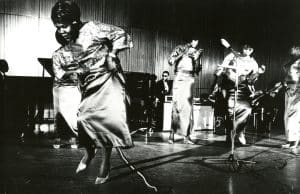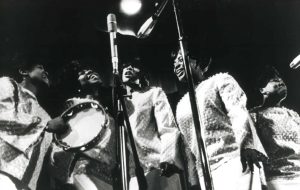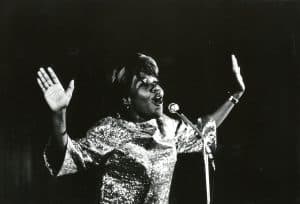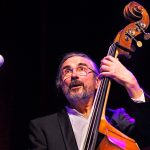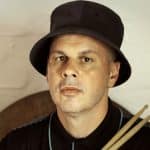Jazz in Resistance: The Ukrainian Jazz Scene in Wartime
by Mariana Bondarenko, Head of Music at Ukrainian Institute
Kyiv, April 2025
Since the full-scale Russian invasion of Ukraine began on 24 February 2022, every aspect of Ukrainian life has been deeply affected — and the jazz scene is no exception. But even under constant threat, shelling, blackouts, and displacement, Ukrainian jazz has not only survived — it has found new strength, resilience, and international recognition.
Before the full-scale invasion, jazz in Ukraine — like everywhere else — was largely about artistry, experimentation, and joy. Musicians explored the boundaries of sound, created grooves, played festivals, recorded albums, and shared them with their audiences. But with the outbreak of war, the very function of music shifted. It became more than art. It became a message, a weapon of truth, a shield for the spirit, and a bridge to the world.
Music as Resistance and Healing
In the first months of the war, jazz musicians in Ukraine immediately took action. Some joined the military. Some organized benefit concerts in bomb shelters, train stations, and underground metro tunnels. Others took their instruments abroad, spreading the story of Ukraine through music. Initiatives like Music Battalion, which started back in 2014, Music Battalion continued their important work, bringing music to troops and civilians alike.
In Lviv, the initative Music Cultural Front began by organizing jazz concerts at the railway station for refugees, later expanding to online and offline charity concerts, even from bomb shelters. In Kharkiv, Kharkiv Music Fest opened with a concert in the subway — a powerful symbol of cultural defiance.
Due to the fact that many jazz musicians from various regions in Ukraine found shelter in Lviv, it resonated in a special program Jazz relocation at Jazz Bez festival in 2022 featuring musicians from Kharkiv, Dnipro, Kyiv and other cities. Moreover, several of them have also begun teaching at the Mykola Lysenko Music Academy in Lviv. Usein Bekirov, originally from Crimea and later based in Kyiv, now leads the jazz department, while Yakiv Tsvetinsky from Dnipro and Viktor Pavelko from Kyiv have joined as senior faculty members.
Jazz clubs, once shuttered by the war, gradually began reopening in cities like Kyiv, Odesa, Rivne, Chernihiv, and Lviv. Even in the face of displacement, many festivals kept going — or reemerged with new strength. Jazz Bez, Art Jazz Festival in Rivne, Jazz Kolo, Lviv Jazz Days and Bouquet Kyiv Stage all returned with programming that blended local and international acts. Remarkably, Bouquet Kyiv Stage also established itself abroad, with winter and summer editions in London since 2022, and a Georgian edition in Tbilisi.
Artistic Residencies as Safe Havens and Creative Hubs
International artist residencies offered Ukrainian jazz musicians not only physical protection during the war, but also creative continuity and access to new audiences. In Poland, Katowice City of Gardens, led by Martyna van Niewland, initiated a dedicated residency program for Ukrainian musicians. It provided resources, rehearsal spaces, professional contacts, and performance opportunities in the region.
Similar initiatives took place in Sweden: Musikcentrum ÖST in Stockholm launched a residency program that enabled Ukrainian artists to develop projects, collaborate with Swedish musicians, and participate in local festivals. In cooperation with Stim and the Stim Forward Fund, eleven musicians and music professionals from Ukraine were supported in Sweden during 2022–2023, with funding from the Postcode Foundation. Since 2024, the collaboration has continued through the capacity-building program Resonate UA. The first delegation of Ukrainian musicians will take part in jazzahead! in Bremen and present their projects to an international professional audience.
Emerging Platforms and New Generations
Despite the mass displacement of Ukrainians — including students and young artists — music education in Ukraine has continued. Music academies remain operational, and a new student jazz club “43” has opened at the Kyiv Municipal Academy of Music named after R. Glier, nurturing the next generation of Ukrainian jazz musicians.
An outstanding initiative is the Drum Island Fest, launched in 2022 by drummer and composer Dmytro Khoroshun — as a response to the many displaced children in Kyiv. The festival creates a safe space for young drummers and today offers not only competitions but also masterclasses, jam sessions, and mentoring. In 2024, the team participated as a delegation in the Überschlag Festival in Hannover — facilitated by the Ukrainian Institute. In 2025, the festival will present its first international line-up featuring Alirio Torrealba (Venezuela) and Christin Neddens (Germany).
Independent communities such as Fusion Jams have developed into creative hubs for modern jazz experimentation. It was here that the band Hyphen Dash was formed, saxophonist Andrii Barmalii presented his own compositions for the first time, and guitarist Yevhen Puhachov, keyboardist Yevhen Dubovyi, and drummer Mykhailo Halaktionov founded their own quartets. In March 2025, the scene celebrated its six-year anniversary with acts such as Hyphen Dash, Yevhen Puhachov Quartet, BITLO, and Aesthetic Combination — the voice of a bold new generation.
Inspired by the Swedish jazz network KNUTPUNKT, the 32 Jazz Club in Kyiv initiated the founding of the MayDay Art network for new jazz venues in Ukraine. In cooperation with the Ukrainian Institute, a Ukrainian-Belgian tour was organized in 2024, featuring four concerts and two masterclasses across four cities.
Resilience on the Frontlines
Many musicians are not only cultural ambassadors but also active defenders of their country. Some are fighting on the front lines — among them saxophonist, composer, and bandleader Danylo Vinarikov from Dnipro, now director of the Dnipro Big Band of the Dnipro Philharmonic. After returning from the front, he founded a festival in 2024 in memory of Serhii Artemov, a fellow musician who was killed in the war. The Ukrainian Institute published a sheet music collection titled “Serhii Artemov. In Memoriam” featuring eight of his compositions, which have since been performed at concerts in Ukraine and abroad — including the NUEjazz Festival and the Hof Jazz Nights in Germany, as well as at a tribute concert in Montréal. Further performances are planned.
Culture Supporting the Frontlines
Since the beginning of the war, many musicians have been raising funds or donating their fees to support the Ukrainian army. One of the most sustainable initiatives is “NaShapku” (literally: “For the Hat”) – a weekly benefit concert series, initiated by radio host Sonia Sotnyk together with the Svoi Foundation. Since 2015, more than 210 concerts have been held, raising over 6.7 million UAH (approx. €160,000). Proceeds have supported medical supplies — including one of the largest collections of oxygen concentrators during the COVID-19 pandemic — and now go toward medical aid for soldiers. Every Thursday, the NaShapku community gathers at the Pepper’s Club in Kyiv to enjoy outstanding jazz acts.
International Partnerships
Since 2022, the Ukrainian jazz scene has become part of the international discourse: Ukraine presented its own stand for the first time at jazzahead!, supported by the Ukrainian Institute. Acts such as Vadim Neselovsky, Ihor Osypov, LELEKA, GANNA, and DZ’OB performed in showcase concerts. A national delegation of showcase artists was also present at WOMEX. Since then, Ukrainian delegations have regularly participated in both events.
Another milestone was the Ukrainian Institute’s accession to the Europe Jazz Network (EJN) in 2023. Since then, a directory of Ukrainian musicians in the diaspora has been published, and the Ukrainian jazz scene has been officially included in the EJN Jazz Panorama. Delegations now take part annually in the European Jazz Conference – a platform for exchange, new collaborations, and increased visibility.
Notable examples include:
- Sweden–Ukraine: Drummer Peter Danemo and bandurist Georgi Matviiv — a dialogue between Nordic sound aesthetics and Ukrainian depth.
- Global Jazz – Ukraine: Pianist Usein Bekirov veröffentlichte das Album Free Way mit Legenden wie Bill Evans, Frank Gambale, Michael League und Dennis Chambers.
- Belgien–Ukraine: Pianist Ivan Paduart, Gitarrist Patrick Deltenre, Bassist Ihor Zakus und Drummer Yaroslav Borys traten gemeinsam in der Ukraine auf – organisiert im Rahmen der Green Pilot Tours.
- Deutschland–Ukraine: Die Band LELEKA mit Sängerin Viktoria Anton und Gastmusiker Maksym Berezhniuk veröffentlichte das Album RIZDVO – ukrainische Weihnachtslieder in Jazzvariationen.
- Polen–Ukraine: Pianistin Kateryna Ziabliuk spielte mit der polnischen All-Female-Jazzband N.E. im Showcase bei jazzahead! 2024.
- Portugal–Ukraine: Sängerin Kateryna Avdysh veröffentlichte ihr Debütalbum Always Alive, u. a. mit dem Song One Way Ticket im Duett mit Salvador Sobral (ESC-Gewinner 2017).
Media Partnerships and Visibility
In 2023, Jazz Forum (Poland) dedicated an entire issue to the Ukrainian jazz scene. In France, Citizen Jazz published the special edition We Insist! in cooperation with Meloport and the Ukrainian Institute. In 2024, the project Ukrainian-Polish Jazz Connections (within the framework of Grace Note and JazzKultura) launched an extensive research into the jazz history of both countries, resulting in articles and interviews.
The magazine All About Jazz launched the series A Brief Guide to Ukrainian Jazz – an international overview of the scene.
Conclusion
As the war persists and the challenges grow deeper, Ukrainian jazz remains a vibrant force of resistance and resilience — one that transcends borders, unites communities, and keeps the soul of a nation alive. But to sustain this momentum, continued international collaboration is essential. We call on jazz institutions, festivals, venues, curators, educators, and fellow musicians around the world to support Ukraine’s jazz scene — through residencies, bookings, commissions, educational exchanges, and creative partnerships.
These projects helped amplify Ukraine’s musical voices and highlight its creative resistance on the global stage.
Now, more than ever, Ukrainian jazz needs the world — and the world needs the courage and creativity that Ukrainian jazz brings.
Let’s keep playing. Let’s keep listening. Let’s stand together.







